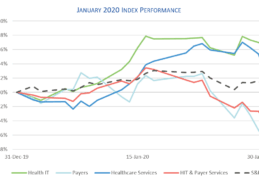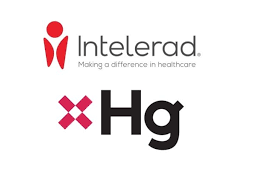During the past decade, the healthcare industry has undergone an unprecedented technological transformation. The industry, once defined by manual processes, has moved squarely into the digital age. As patients, we’ve all become accustomed to seeing physicians as well as clinical staff use laptops during office visits. And behind the scenes, hospitals and health networks have made substantial investments in financial and HR systems, among others.
One of the more significant digital
Read More
Analysis: January Health IT M&A Activity; Public Company Performance
– Healthcare Growth Partners’ (HGP) summary of Health IT/digital health mergers & acquisition (M&A) activity, and public company performance during the month of January 2020.
Ten years into the bull market, we operate in a heightened state of awareness for any indication of market weakness that may signal a downturn. While debt levels are rising and GDP growth somewhat sluggish, the world of private equity, public equity, and M&A continues to be in full swing bull market
Read More
Hg Takes Majority Holding in Intelerad: 3 Major Implications to Know
- On 23rd Jan 2020, Hg Capital announced it had agreed to acquire a majority stake in imaging IT software vendor Intelerad Medical Systems from previous majority stake owners Novacap.
- The founders, management and employee shareholders at Intelerad will be reinvested, with Novacap remaining as a minority shareholder.
- The company has undergone significant growth in the last four years, announcing a USD75m R&D program in 2019 and acquiring imaging IT workflow specialist Clario Medical
Read More
3 Ways Healthcare IT Depts Can Start Prepping for “Medicare For All”
Once a long-shot, the idea of universal healthcare in the U.S. is inching closer to reality, particularly as many 2020 candidates promise an expedient implementation of a national federally-run program (or some version of it). Nearly half of doctors support a “Medicare for all” model, and while this won’t change the practice of medicine, it will greatly affect how those providers use technology to run their businesses.
This is particularly true for small- and medium-sized providers; large
Read More
Biometrics Litigation in Healthcare: Symptoms May Include Statutory Damages
Over the last few years, hundreds of putative class actions have been filed under the Illinois Biometric Information Privacy Act (BIPA), which governs the collection, use, and storage of biometric information belonging to Illinois residents. Among the biggest targets of recent BIPA lawsuits are healthcare providers, including hospitals, long-term care facilities, and nursing homes.
Biometric data is no longer just a figment of science fiction writers’ imaginations. In recent times, private
Read More
A Matter of Trust: 3 Tips for Outsourcing Out-of-Pocket Support
The cost of family health coverage topped $20,000 this year—as much as an economy car. As consumers shoulder higher out-of-pocket costs than ever, health systems are bracing for the impact.
A recent survey found that while 81 percent of healthcare leaders say rising consumer responsibility will affect revenue, leaders of larger organizations are even more concerned about the toll on finances:
- 33 percent of health system executives believe increased consumer responsibility will have a
Read More
3 Ways IoT Sensors Can Improve Care for Aging Populations
- As the aging population grows, IoT-sensors and enabled devices can fill in the gaps where families lack visibility and nurses lack time or resources.
Healthcare has arrived at a critical inflection point. Baby boomers, the largest living generation of 72 million people, are reaching the age where they require more care. This surge in seniors coincides with other care-related variables, including Baby Boomers’ evolving lifestyle expectations and the current nursing shortage. Providers,
Read More
Wearables Could Transform Insurance from Reactive to Proactive
Insurance policies have existed for thousands of years and were initially invented to protect goods being shipped long distances. Today, the options available to us have expanded tremendously, and it’s even possible for soccer players like David Beckam to insure their legs.
Despite this, the business of insurance and how it’s managed hasn’t evolved as rapidly. And this is understandable, as it’s a highly regulated industry, so reliability and dependability are hugely important.
Read More
Why Government-Supported Health Plans Must Make Encounter Submissions A Top Priority in 2020
Encounter data such as diagnosed clinical conditions and services, or items delivered to healthcare consumers to treat these conditions is the key to success for all healthcare organizations participating within the government space. Whether doctors or hospitals are submitting data for medical services rendered under Medicare Advantage, the Affordable Care Act’s state exchanges or Medicaid, encounter data is used for payment reimbursement and reconciliation between the health plan and the
Read More
AI Will Continue to Improve Healthcare, But Only If We Can Trust It
While the public perceives artificial intelligence as futuristic, AI is already intertwined with healthcare today. As a PwC report observed, AI is transforming numerous aspects of healthcare, from medical training and research to wellness and treatment. But while AI is already supercharging our capabilities (it’s 30 times faster and 99 percent accurate when reviewing mammograms, reducing the need for unnecessary biopsies, for example), AI is also supercharging the disparities that are baked into
Read More











